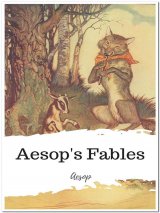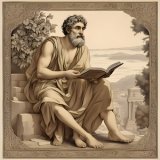Aesop's Fables Page #2
Aesop's Fables, or the Aesopica, is a collection of fables credited to Aesop, a slave and storyteller believed to have lived in ancient Greece between 620 and 564 BCE.
THE CAT AND THE BIRDS A Cat heard that the Birds in an aviary were ailing. So he got himself up as a doctor, and, taking with him a set of the instruments proper to his profession, presented himself at the door, and inquired after the health of the Birds. "We shall do very well," they replied, without letting him in, "when we've seen the last of you." A villain may disguise himself, but he will not deceive the wise. THE SPENDTHRIFT AND THE SWALLOW A Spendthrift, who had wasted his fortune, and had nothing left but the clothes in which he stood, saw a Swallow one fine day in early spring. Thinking that summer had come, and that he could now do without his coat, he went and sold it for what it would fetch. A change, however, took place in the weather, and there came a sharp frost which killed the unfortunate Swallow. When the Spendthrift saw its dead body he cried, "Miserable bird! Thanks to you I am perishing of cold myself." One swallow does not make summer. THE OLD WOMAN AND THE DOCTOR An Old Woman became almost totally blind from a disease of the eyes, and, after consulting a Doctor, made an agreement with him in the presence of witnesses that she should pay him a high fee if he cured her, while if he failed he was to receive nothing. The Doctor accordingly prescribed a course of treatment, and every time he paid her a visit he took away with him some article out of the house, until at last, when he visited her for the last time, and the cure was complete, there was nothing left. When the Old Woman saw that the house was empty she refused to pay him his fee; and, after repeated refusals on her part, he sued her before the magistrates for payment of her debt. On being brought into court she was ready with her defence. "The claimant," said she, "has stated the facts about our agreement correctly. I undertook to pay him a fee if he cured me, and he, on his part, promised to charge nothing if he failed. Now, he says I am cured; but I say that I am blinder than ever, and I can prove what I say. When my eyes were bad I could at any rate see well enough to be aware that my house contained a certain amount of furniture and other things; but now, when according to him I am cured, I am entirely unable to see anything there at all." THE MOON AND HER MOTHER The Moon once begged her Mother to make her a gown. "How can I?" replied she; "there's no fitting your figure. At one time you're a New Moon, and at another you're a Full Moon; and between whiles you're neither one nor the other." MERCURY AND THE WOODMAN A Woodman was felling a tree on the bank of a river, when his axe, glancing off the trunk, flew out of his hands and fell into the water. As he stood by the water's edge lamenting his loss, Mercury appeared and asked him the reason for his grief; and on learning what had happened, out of pity for his distress he dived into the river and, bringing up a golden axe, asked him if that was the one he had lost. The Woodman replied that it was not, and Mercury then dived a second time, and, bringing up a silver axe, asked if that was his. "No, that is not mine either," said the Woodman. Once more Mercury dived into the river, and brought up the missing axe. The Woodman was overjoyed at recovering his property, and thanked his benefactor warmly; and the latter was so pleased with his honesty that he made him a present of the other two axes. When the Woodman told the story to his companions, one of these was filled with envy of his good fortune and determined to try his luck for himself. So he went and began to fell a tree at the edge of the river, and presently contrived to let his axe drop into the water. Mercury appeared as before, and, on learning that his axe had fallen in, he dived and brought up a golden axe, as he had done on the previous occasion. Without waiting to be asked whether it was his or not the fellow cried, "That's mine, that's mine," and stretched out his hand eagerly for the prize: but Mercury was so disgusted at his dishonesty that he not only declined to give him the golden axe, but also refused to recover for him the one he had let fall into the stream. Honesty is the best policy. THE ASS, THE FOX, AND THE LION An Ass and a Fox went into partnership and sallied out to forage for food together. They hadn't gone far before they saw a Lion coming their way, at which they were both dreadfully frightened. But the Fox thought he saw a way of saving his own skin, and went boldly up to the Lion and whispered in his ear, "I'll manage that you shall get hold of the Ass without the trouble of stalking him, if you'll promise to let me go free." The Lion agreed to this, and the Fox then rejoined his companion and contrived before long to lead him by a hidden pit, which some hunter had dug as a trap for wild animals, and into which he fell. When the Lion saw that the Ass was safely caught and couldn't get away, it was to the Fox that he first turned his attention, and he soon finished him off, and then at his leisure proceeded to feast upon the Ass. Betray a friend, and you'll often find you have ruined yourself. THE LION AND THE MOUSE A Lion asleep in his lair was waked up by a Mouse running over his face. Losing his temper he seized it with his paw and was about to kill it. The Mouse, terrified, piteously entreated him to spare its life. "Please let me go," it cried, "and one day I will repay you for your kindness." The idea of so insignificant a creature ever being able to do anything for him amused the Lion so much that he laughed aloud, and good-humouredly let it go. But the Mouse's chance came, after all. One day the Lion got entangled in a net which had been spread for game by some hunters, and the Mouse heard and recognised his roars of anger and ran to the spot. Without more ado it set to work to gnaw the ropes with its teeth, and succeeded before long in setting the Lion free. "There!" said the Mouse, "you laughed at me when I promised I would repay you: but now you see, even a Mouse can help a Lion." THE CROW AND THE PITCHER A thirsty Crow found a Pitcher with some water in it, but so little was there that, try as she might, she could not reach it with her beak, and it seemed as though she would die of thirst within sight of the remedy. At last she hit upon a clever plan. She began dropping pebbles into the Pitcher, and with each pebble the water rose a little higher until at last it reached the brim, and the knowing bird was enabled to quench her thirst. Necessity is the mother of invention. THE BOYS AND THE FROGS Some mischievous Boys were playing on the edge of a pond, and, catching sight of some Frogs swimming about in the shallow water, they began to amuse themselves by pelting them with stones, and they killed several of them. At last one of the Frogs put his head out of the water and said, "Oh, stop! stop! I beg of you: what is sport to you is death to us."
Translation
Translate and read this book in other languages:
Select another language:
- - Select -
- 简体中文 (Chinese - Simplified)
- 繁體中文 (Chinese - Traditional)
- Español (Spanish)
- Esperanto (Esperanto)
- 日本語 (Japanese)
- Português (Portuguese)
- Deutsch (German)
- العربية (Arabic)
- Français (French)
- Русский (Russian)
- ಕನ್ನಡ (Kannada)
- 한국어 (Korean)
- עברית (Hebrew)
- Gaeilge (Irish)
- Українська (Ukrainian)
- اردو (Urdu)
- Magyar (Hungarian)
- मानक हिन्दी (Hindi)
- Indonesia (Indonesian)
- Italiano (Italian)
- தமிழ் (Tamil)
- Türkçe (Turkish)
- తెలుగు (Telugu)
- ภาษาไทย (Thai)
- Tiếng Việt (Vietnamese)
- Čeština (Czech)
- Polski (Polish)
- Bahasa Indonesia (Indonesian)
- Românește (Romanian)
- Nederlands (Dutch)
- Ελληνικά (Greek)
- Latinum (Latin)
- Svenska (Swedish)
- Dansk (Danish)
- Suomi (Finnish)
- فارسی (Persian)
- ייִדיש (Yiddish)
- հայերեն (Armenian)
- Norsk (Norwegian)
- English (English)
Citation
Use the citation below to add this book to your bibliography:
Style:MLAChicagoAPA
"Aesop's Fables Books." Literature.com. STANDS4 LLC, 2025. Web. 4 Jan. 2025. <https://www.literature.com/book/aesop%27s_fables_316>.




Discuss this Aesop's Fables book with the community:
Report Comment
We're doing our best to make sure our content is useful, accurate and safe.
If by any chance you spot an inappropriate comment while navigating through our website please use this form to let us know, and we'll take care of it shortly.
Attachment
You need to be logged in to favorite.
Log In